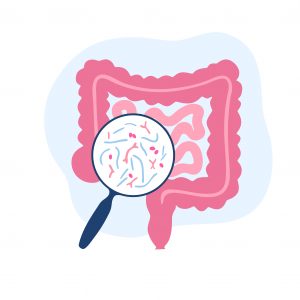Now that the new year is a few weeks old already, we hope that the resolutions for 2023 have not yet been thrown overboard. With growing health awareness, losing excess pounds is high on the wish list for many people, along with adopting better eating habits, getting more exercise and spending more time with friends and family.
However, this is often easier said than done. And: the weight that was lost with great effort may return faster than one would like. Because most common methods of losing weight are based solely on reducing the calorie intake, they can lead to fatigue, lack of energy and an overall feeling of being unwell.
Those methods ignore that a sharply reduced food intake can result in a weaker metabolism. If the digestive system isn’t stimulated systematically along with such regimens, the dreaded yo-yo effect can set in and you may end up weighing more than what you started out with.
Ayurveda – getting to the root of weight problems
In Ayurveda, on the other hand, overweight – and also underweight – has been addressed for thousands of years with a combination of many natural methods to achieve and maintain our individual ideal weight.
Ayurveda understands that weight problems are not just a question of eating too much or too little and that the personal Agni (metabolism) plays an important role. For example, a slow cell metabolism can lead to an increase in weight even with a relatively low food intake, while a high basic metabolic rate can lead to weight loss despite eating more.
Other determining factors include the composition and timing of the meals, the amount of Ama (metabolic residues and toxins) accumulated in the tissues, the intestinal flora, the amount of physical activity, and our individual lifestyle.
When the metabolism is in a state of equilibrium, the food we eat is broken down into useful building blocks that build up healthy body tissue. But when metabolic functions are disturbed, molecules are produced which are only partially processed. And when these are deposited throughout the body, circulation is restricted and a fundamental imbalance develops.
To achieve and maintain your personal ideal weight, it is crucial to address the disturbed functioning of the body and to restore our natural balance.
Reset the metabolism and start losing weight
Instead of merely fasting, then putting on weight again later, it is recommended to go for a ‘reset’ with a Maharishi Ayurveda course of treatment focused on weight loss. During the classic Panchakarma detox cure, you are served delicious vegetarian Ayurvedic food that is specially designed and prepared for purification and detoxification. Pleasant and deeply relaxing Ayurvedic treatments improve the strength of our digestion and the basal metabolic rate, and then weight loss occurs naturally. In addition, Ayurvedic massages dissolve long-stored metabolic waste products layer by layer and thereby increase metabolic efficiency.
Intestinal flora and weight loss
Did you know that about 2 kilograms of bacteria, representing more than 400 species, populate our intestines? Even the stool consists of 30–50% excreted bacteria. This gives a feeling of how important the intestinal flora’s influence on the human organism must be.
Among the most useful bacterial strains are the Firmicutes strains and the Bacteroidetes, which, if imbalanced, can lead to numerous health disorders, including obesity.
In this context: the intestinal flora changes with the body weight, i.e. in the case of a diet very rich in sugar and fat, certain bacterial strains multiply in excess, which causes increased caloric intake, and this of course promotes obesity. A 20% increase in Firmicutes alone can increase caloric intake (from the same amount of food) by 10%.
Studies show that overweight people’s intestinal flora is different than that in trim or skinny people, and that this flora realigns itself upon weight loss, adapting to the new situation. When intestinal flora is rich in Firmicutes and poor in Bacteroidetes, more calories are absorbed from the intestine, i.e. the ingested food is processed more efficiently. In very slim people, this is often the other way around: they seem to be able to eat vast amounts of food without gaining a single gram. But caution is due: the fact that these people are not overweight does not automatically mean that they are in better health. Therefore, it’s not enough to simply reduce calorie intake to address overweight – to keep the intestinal flora in balance, your diet should be balanced and rich in fiber.
Tips from Ayurveda you can use to promote good health and lose weight:
– First thing in the morning, drink a glass of slightly warm water mixed with the juice of half a lemon and a teaspoon of organic honey. Starting the day this way refreshes, cleanses the digestive tract, keeps your intestinal flora healthy, and supports weight loss. Recent medical findings show that the composition of our intestinal flora not only influences our mood, but also our craving for sweets and other stimulants.
– During the day, every half an hour, drink a few sips of hot water. If you prepare it in the morning (simmer for 10–20 minutes, then fill it into a thermos) you can also take it with you. The repeated warmth stimulus in the digestive tract activates the metabolism in all body cells and thus aids in weight loss.
So as not to dilute the digestive juices, stop drinking from half an hour before meals until about 60–90 minutes afterwards, depending on the size of the meal. However, during the meal, you can drink hot water in small sips.
– Several times a day, drink barley water: simmer 1-2 tablespoons of barley in 1 liter of water for at least 20 minutes, until the water becomes viscous. After boiling, strain the barley water, pour it into a thermos and drink it at intervals spread over the day.
– Eat a maximum of three, or better two, meals a day and avoid snacking in between. When you feel very hungry, you can drink a glass of hot water with a few slices of ginger or a pinch each of hot spices such as black pepper, cloves, and cumin. This fills your stomach and activates the metabolism.
– Develop a habit to listen to your physiology’s signals regularly: Pay attention to your natural hunger and especially to the point of satiety.
– Gradually remove sugar and soft drinks from your diet; reduce grains and replace them with more vegetables or, in the summer, salads.
– Promote weight loss by harnessing the power of pungent, bitter and astringent spices to activate the metabolism: black and long pepper, ginger, cumin, ajwain, cloves and turmeric.
– Perform ‘Garshan’ in the morning, if possible daily. Garshan is a full-body dry massage with gloves made of raw silk. It activates the physiology and also supports weight reduction.
– Regular yoga exercise not only relaxes the mind and tones the body, but also melts away fat deposits by activating the gastrointestinal tract.
– Instead of taking a nap after lunch, rest for just five minutes and then go for an after-meal walk. A brisk walk boosts the metabolism and can revive your spirits, especially in the afternoon.
– Learn Transcendental Meditation and practice it for 15–20 minutes twice a day. The deep rest significantly reduces your stress level and makes you less likely to reach for alcohol, sweets, etc.
– Have only a very light evening meal, such as a vegetable soup, and the earlier, the better. It is best not to eat anything after 18:00.
– Go to bed early, no later than around 22:00. This insight from Ayurveda has recently been confirmed by modern medical research: people with a delayed sleep schedule have a much harder time losing weight compared to early sleepers on an identical diet.
– Have a regular liquid day, ideally every week, during which you take only fresh juices and soups.
One day of the week to unburden
Generally, Ayurveda highly recommends unburdening by ‘liquid fasting’ once a week, especially if you have a predominance of Pitta or Kapha Dosha. If you have a strong Vata Dosha, the advice is to take liquid-diet days only when you feel relaxed and well-anchored.
Around Christmas, Easter, and other festive occasions when we tend to eat too much and too rich food, drink alcohol, and get very little exercise, inserting one day to disburden can bring great relief. It is a proactive way to prevent overloading your physiology. Without it, the body can’t properly process all that food, typically taken late in the day as well, and quite literally clogs up.
Ayurveda has a name for the residues of incomplete digestion: Ama. Ama clogs up the subtle channels and spaces in the body, and this leads to many disorders.
To clear out Ama, Ayurveda advises regular liquid-diet days. As the classical texts say: Those who take only liquids once a week live many years longer in full health.
Taking a weekly liquid-diet routine is most important if you have a surplus of Kapha Dosha. If you are a ‘Pitta person’, you will also greatly benefit from liquid fasting one day a week, as people with a predominance of Pitta Dosha tend to eat more than they should, especially under stress.
Enjoy a cure
It isn’t easy to change long-standing habits, as also the mind needs to be ‘reset’. Fortunately, there is a wonderful way to achieve that, even within a short time: an in-residence Panchakarma course of treatment. And the best thing is that it doesn’t require you to follow a strict diet, even if you have a few extra pounds. Instead, you will experience the full variety of delicious Ayurvedic cuisine. The imbalance of the metabolism that causes overweight is restored to its natural balance by the Maharishi Ayurveda treatments and therapies which the doctor prescribes for your individual situation. During the concluding consultation, you will be given recommendations for herbal mixtures and individual dietary and behavioral tips that can further the success of the treatment and ensure lasting results.
Experience an authentic Panchakarma cure in Bad Ems, under medical supervision and with specially trained, empathetic therapists, without traveling halfway around the world. Here, in the heart of Germany, is Europe’s leading Ayurvedic health center.
More information about Panchakarma.
Download the article as a PDF file
© Maharishi Ayurveda Health Center Bad Ems







